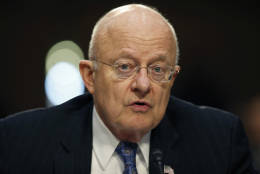Defense
-
Defense-minded voters have been left with relatively little to go on as the nation nears the end of a presidential campaign that’s included only scant discussion of military issues.
October 31, 2016 -
With only a few months left before his tenure as Defense secretary expires, Ashton Carter took one more step to drive home his point that the Pentagon needs more "innovation" in its bloodstream.
October 31, 2016 -
It’s a good bet that most Americans have never heard of the military’s Joint Task Force Civil Support. That’s due, in good measure, to the fortunate fact that it’s never had to perform its primary mission during its 17 years in existence: deploying military forces to the site of a chemical, biological, radiological or nuclear (CBRN) disaster.
October 27, 2016 -
Welcome to the #FedFeed, a daily collection of federal ephemera gathered from social media and presented for your enjoyment.
October 26, 2016 -
The Air Force is still struggling to shorten its contract award times as it begins a big modernization push.
October 26, 2016 -
Former DHS CHCO Jeff Neal says agencies handle overpayments in different ways, but the basic processes are similar.
October 26, 2016 -
If the Defense Department is getting financial savings from its contracted work, it either doesn't know or just isn't reporting it. Nor has the department developed a plan for getting more efficiency out of its staff and contractors. A lot of work yet to be done. Brenda Farrell, director of defense capabilities and management issues at the Government Accountability Office, talks to Federal Drive with Tom Temin about GAO's latest work on civilian workforce costs
October 26, 2016 -
For the Navy, virtual reality is more than a training tool. It's also becoming a novel way of public outreach. The Recuiting Command plans to field trailer-sized virtual reality chambers to let citizens experience a real-life Navy Seal operation. Capt. Dave Bouve, the national director of Navy Marketing and Advertising. He talked about the VR project on Federal Drive with Tom Temin.
October 26, 2016 -
The time has come to split U.S. Cyber Command from the National Security Agency and assign separate leaders to each organization, the nation’s top intelligence official said Tuesday.
October 26, 2016 -
Defense test and evaluation gets some new suggestions from the Defense Business Board.
October 25, 2016 -
The Pentagon says its new Silicon Valley-based technology outreach office is seeing some early successes in rapid acquisition. It handled its first dozen procurements in an average time of 60 days. But most of the money it spent went to established companies, not garage-style startups.
October 25, 2016 -
The Pentagon last week made contract awards in its promised expansion of federal government’s first-ever bug bounty — the “Hack the Pentagon” challenge which would up finding and closing 138 separate cybersecurity vulnerabilities in DoD’s public-facing websites earlier this year.
October 24, 2016 -
The Homeland Security Department and the Defense Department are among the agencies that are out in front in shifting their cyber focuses toward applications.
October 24, 2016 -
The federal government’s cybersecurity policy has reached a crossroads, and the upcoming presidential transition is an opportunity to take a long, hard look in the mirror, and decide how to move forward.
October 21, 2016 Megan Mahle, business operations manger for the cybersecurity division of the Department of Homeland Security's Science and Technology Directorate, joins host Derrick Dortch to discuss the mission of the organization. October 21, 2016
October 20, 2016














